(2007) The Pesthouse Read online
Page 2
To some extent their mother had been correct. They had moved fast, and no one had bothered them yet, while anyone else among the emigrants who'd been rash enough to travel in the company of carts and animals or had packed a year's supply of food and their prize possessions — best pots, jewelry, good cloth, good tools — paid a price for their comfort. The more they had, the more cruelly they were robbed, not by the other travelers but by the ones who wouldn't emigrate until they'd picked the carcass of America clean. But possibly two men like them — young, strong and imposingly tall — would not be robbed, even if they were walking naked with shards of polished silver in their beards. Jackson and Franklin Lopez, together, looked too capable of taking care of themselves to invite the attentions of thieves. And this had made them much valued as companions by other travelers, especially as their extra strength would always be prized by any wagoner, for example, who faced a hill or mud, and would recompense them with a meal if only they would be his heavy horses for the afternoon.
No, Ma was right, wagons were slow and cumbersome. They might not have stomachs, feet and knees to let their owners down, but their axles snapped if stressed too much, and they were unsteady on gradients and hesitant at fords, with good reason. Rivers loved to test the strength of vehicles. A river's always pleased to have the opportunity to dismantle a wagon, to tear it into planks and carry it away in bits, together with its wagoner. Horses were less hesitant. They were fast and muscular. They didn't refuse the rivers or the gradients, so long as there were sticks and sugar lumps to urge them on, but they were flesh and bones and prone to injury and sickness. Just like men and women. But, just like men and women, horses' running costs were high, for oats and hay, board and lodging, tolls and tack.
Pack mules were the toughest of the lot. And cheap. More so than hinnies. A bucket of Cottonwood bark or thistle and bitter water every night was all they needed. 'If a rabbit can pass, a mule will pass,' the mulemen boasted. But mules were stubborn, too. Both placid and stubborn. You could twitch the ropes in their lip rings or tug on their jerk lines until they bled, but still they wouldn't move unless it suited them. They had the patience to resist for ever. The brothers had been wise, so far, to travel without animals or wheels.
But now, with their few possessions laid out around them at the top of the descent and the first indications that the coming night would be a wet and cold one, the brothers — Franklin especially — regretted that they had not equipped themselves better for such foreseeable emergencies. There were no cooking pots, they had no camping supplies, and except for a few scraps the store of food had been finished a month before. Their ma — she was far too old and metally at fifty-four, she'd said, to join them on their journey, too fat to go that far — was at that very moment most likely sitting on her stoop, rubbing her veins, and looking out across the now abandoned steads at the family cart and the three old roans for which she had no use. If Jackson and Franklin had only traveled with those horses and the cart, her sons would be at the river crossing by now, and Franklin would not be limping. Or at least they'd have some warmth and free shelter for the night, up on the rapidly cooling hillside. But they had never been the sort to disoblige their ma. Big but biddable, they were, for her. Big and unprepared for what the world could do to them.
Now the brothers had to face the prospect of some nights apart — the very thing that ma had said should not occur — while Jackson went ahead to sell his labor for a day or two and obtain some food. He'd leave his brother with their knives, the leaking water bag, the spark stone, the pair of tarps, their change of clothes and make do trading with his strength and overcoat. That heavy, much loved overcoat that his mother had stitched together from four farm goats would have to go despite the colder days ahead. It was the one thing that the brothers had that, though it had not quite been admired, had certainly been noticed by strangers. Being noticed might prove to be a handicap as they got closer to the lawless coast. So trading on the goats would be advisable. With any luck, Jackson would soon return with provisions and possibly the part-share of an onward-going horse or at least the purchase of a cart ride among the women, the children and the old for his unmanly brother. Once in Ferrytown, if the worse came to the worst, they could pass the winter in relative safety. For the time being, though, Franklin would have an uncomfortable few nights on the mountainside; Jackson would have a proper bed. The best that Franklin could hope for was a mattress of pine cones.
Franklin might not be on his own entirely. Already he could hear the chirring of insects, the whistle of quails and barking deer. And there was a boulder hut — evidently occupied, though possibly by lunatics or bandits, Jackson warned, amused to alarm his brother — on the edge of the tree line a hundred paces off, where a large but unmaintained bald had been burned clear by hunters. There was no movement from within, so far as they could tell, just smoke. 'Keep your distance. That's best.'
And Franklin would not be entirely out of touch with his brother and their shared hopes. Despite the pain in his knee, he had succeeded in reaching the final woody swaggings in the sash of hills where there were almost uninterrupted views to the east. His hopes of getting free from America could be kept alive by a distant prospect of the lake, the town and the longed-for river crossing, after which, they'd been told, the going was less hilly, though punishing in more unusual ways.
It was late afternoon when his elder, tougher, taller brother shook his hand and set off down the track, promising to come back to the swaggings within three days. The dusk was already pushing daylight back into the sun. Jackson would barely reach Ferrytown before dark. But he was fit and well, not injured yet, and, unlike all the travelers still on the descent with their carts and sledges, their mules and wheelbarrows, he was unencumbered by anything other than his coat. Unlike the mule trains, with their whistle-nagging masters and the packhorses with their bridle bells foretelling all the merriments ahead, he descended silently down the twists of Butter Hill, as it was known locally. (A hill so tortuous and uneven, they claimed, that any milk carried up or down it would be jolted and churned into butter.) You could not miss him, though, even in that gloaming. He was so much taller than the rest and hurrying like a man who was counting on a hot supper, and walking even taller than himself, catlike and stretched (while Franklin walked shrinkingly, his shoulders bunched). The pinto patterns of the goatskins marked him out as someone of account, the sort of man who should be welcome and respected anywhere he went.
Franklin had not dared say so to his brother, but he was more than nervous of the nights ahead. It was not so much the unlikely prospects on such a busy route of cougars, bears and snakes or the more certain prospect (on such a busy route) of human parasites that bothered him. Although he might not be as imposing as his brother — he was much lighter, easier in his skin and so less dangerous — he was still big and strong enough to take good care of himself, should he have no choice, even with Jackson by now far beyond his call. He had two knives. And there were rocks and branches with which to defend himself if any creature, beast or man, were ill advised enough to take him on. But he was uneasy, nevertheless, for no man's tall enough to fend off darkness, shadows, damp and all the lonely terrors of the night.
Once he'd lost sight of his brother and the last few stragglers doing their best to negotiate the steep route through the rock chokes and the willow thickets down to the houses and a good sleep, Franklin made a cocoon of the two rolled tarps on a mattress of tinder-dry leaves and pine cones, and settled down for the night in a grassy bay with his back sack for a pillow. His knee was painful, but he was tired enough to sleep. He spoke the slumber verses to himself, to drive away regrets (the certainty that he would never see his ma again, would never walk their stead), and cleared his head of any thoughts of home or hungry animals or the comforts he was missing.
In what remained of the slanting light, Franklin Lopez tried to sleep while facing east, downhill. The closeness of Ferrytown was a comfort to him: from his high vantage point,
he had seen the busy little lanes and yards, and watched the ferry, its raftboards packed with the day's last emigrants and their suddenly weightless possessions, as it was let out on its fat ropes to drift downstream, never quite capsizing, until the four helmsmen dug in their great oars and poles to bring the craft ashore in the shallows of the deeply graveled landing beach. He had seen the emigrants unload with hardly a wet rim, foot or hoof and set off on a boardwalk of tied logs — their burdens heavy again — across the flood meadows, steaming with mist. Soon the first of them reached the outer river bluffs; and then, the last of the mountains safely at their backs, they began the long haul through what seemed to Franklin from his vantage point to be a green, ocean-like expanse of gently undulating flats and plains, stretching, swell upon swell, so far into the distance that his eyes ran out. He had then watched the ferry, unladen but now set against the river, being towed back upstream by a team of oxen on a winch and beached for the night at the moorings. He had seen the first lamps lit and heard what sounded like a song. Surely Franklin could not wish for a prospect more reassuring or more promising than this.
Once the moon came up above the leaden volumes of clouds, augmenting what was left of day, the lake in the valley — hidden up till then in mist — was like a silver pendant, with the river as its glinting chain. Franklin had not seen so much standing water before. Perhaps the sea would be like that, flat and safe and breathtaking.
2
THE BOULDER HUT on the far side of the bald, well out of danger's way, too high for that night's heavy vapors, was occupied by Margaret, the only stub-haired person in the neighborhoods. Red Margaret. Or the Apricot, as she was called by local men, attracted by her color — and her plumpness — in a land where nearly all the other heads were black, and then were gray or white. Her grandfather, as any parent would, had condemned her coppery tresses to the flames as soon as he had suspected that she was suffering the flux. She'd vomited all day, she'd had diarrhea, she'd shivered like a snow fly but was hot and feverish to touch, she'd coughed as dryly as a jay, there were rashes on her face and arms, her neck was rigid and painful, and the onset of her problems had been cruelly swift, though not as swift as the news of her illness, which had raced around the houses as fast as sound — the sound of her mother weeping — and, once again, turned their compound of dwellings into a place to avoid. Once again, because only three months previously, in the high heat of the summer, her father had gone to bed healthy, sweet, a little overweight, red-haired, just as she had done the night before, and woken up soft, battered and darkened. He'd died of flux, the first of seven townspeople to die and who knows how many unnameable travelers on their journeys to the boats who'd reached the far bank of the river and were out of sight and out of memory before they started shivering.
The flux was carried in and carried out by travelers, or by their goods, or by their animals, or in their bedding, or in their clothes. The illness was an intermittent visitor, unwelcome but well known. So what else could be afflicting Margaret except that self-same flux that must have hidden like a demon in their house since Pa had died, biding its time while choosing someone else's bed to share? And what choice had they but to carry out the rules and protect Ferrytown from her?
Her grandpa — repeating what he'd already done too recently for his son, her father — had shaved her skull, removing all the ginger drama from her head with a shell razor, and then called the closest women in the family, two sisters and her ma, to take off Margaret's body hair, snapping it out to the roots, the last of it wherever it might be — from her eyebrows and, most painfully, her lashes; from her nostrils, even; from her lightly ochered forearms and her legs; elsewhere, the hidden hair — and massage her scalp with pine tallow, until she was as shorn and shiny as a stone and smelling like a newly readied plank.
Everybody in the land must know what shaven baldness signified. No one could mistake her for a safe and healthy woman now. Not for some time. Not for a tress of time. She should not expect a welcome anywhere with that alarming head. But if she were that rarity — a sufferer who could defeat the flux — the regrowth of her hair, once it had reached her shoulders anyway, would prove that she was truly safe again.
They burned her clippings on the outside fire, full thirty-one years of growth reduced in moments to a brittle tar. It smelled like a blacksmith's shop, like horses' hoofs, like carcasses, as you'd expect from such a pestilence. With any luck the venoms of the flux would now have been destroyed by fire, and Margaret would survive her illness, as trees survive the winter if they shed their leaves. At least the flux could not be drawn back into her body through her hair, now that she was almost bald. The signs were good, they told her, hoping to believe these baseless reassurances themselves. No bleeding yet, no body smell. Her father had bled from his mouth and nose. She'd be more fortunate than him. If there were any justice in the world, she'd have the good luck denied to Pa, her mother said.
But still, like him, she'd have to go up to the little boulder Pesthouse above the valley for ten days or so, unattended and unvisited, to see if she recovered or was lost. There was no choice but to be hard-hearted. If any of the travelers were ill, then they were thrown out of town at once. No bed or sustenance for them. But if the victim was a Ferrytowner, the Pesthouse was the only option. Margaret would have to take the westward route up Butter Hill against the tide of history.
The women had already rid themselves of wool and fur and dressed in their safest waxed clothes — garments that were too slickly fibered, they hoped, to harbor any pestilence. They chewed tobacco as protection. Nevertheless, they were unwilling to resist this final risk and their last chance, probably, to make their farewells. They kissed Margaret on her cheek. And the men shook hands with her. Then — when she had gone to pack her bag with her three things and her brother had been sent to prepare the horse — they all washed their fingertips and lips in vinegar. You don't take chances with the flux.
Her grandpa led her on the horse up into the hills that same morning, three slow and ancient travelers, it would seem, the old man taking care with every step, as if his bones were as fragile and as flaky as log ash, the woman slumped across the horse's neck, too weak to sit straight, the mare itself so displeased with the unresponsive weight and the loose stones on the butter-churning climb that it would stop and try to turn whenever the leash was slackened.
Margaret had never been into the hills before. There'd been no need. It was unwise and, indeed, against the community conventions for a local woman to go beyond the palisades unless she was unwell. Time was too precious for useful bodies to wander aimlessly in the neighborhoods. Margaret, like all the other women without husbands or children, was kept busy helping out in the guest house, where there were nearly always more than a hundred meals to serve each evening and beds and breakfasts to make next day.
Her grandpa hadn't been up into the hills very often either. Until the ascent with his ailing son three months previously he hadn't been up to the summit of Butter Hill in many years, not since the travelers, drawn to the river's shallow crossing, had made his town rich. All the more ambitious huntsmen and fishermen had turned to making their fortunes out of farming for the table, ferrying, hospitality and charging everyone for doing anything: crossing charges, passage fees, stabling costs, piloting, provisioning, protection tax, and levies just for wanting to go east.
It was astonishing how wealthy a little hospitality could make the locals. This fertile valley, of which it used to be boasted that you had only to flick a booger on the ground for a mushroom to grow overnight, was now fertile in even less taxing ways: stretch a rope across the road and travelers would pay you with their jewelry, their cloth, their inheritances, just to be allowed to jump over it; toss a rag across a log, call it a bed, and they'd be lining up to sleep in it; shake a chicken's feather at a pot of boiling water and you could make your fortune out of soup.
The only problem was that travelers bring problems of their own, and ones beyond control. Sto
ckades and palisades could keep marauders at bay. The lockup beyond the tetherings with its no-bed and its no-light could hold and quiet down the troublemakers and those who couldn't settle bills in this Stay-and-Pay or On-your-Way community. But illnesses, like bats and birds, were visible only too late, when the damage had been done. The toughest maladies have wings. There are no fees or charges high enough to deter the flux — no palisade is that tall.
IT WAS, AS USUAL, busy on the road. Margaret and her grandpa stepped aside and hid from every descending emigrant they passed, every string of horses, every cart or barrow, every band of hopefuls that made its way downhill. Her head was covered in a heavy blue scarf, so her shorn, white scalp was out of sight. That would not draw any comment from strangers. Even at that time of the year, all travelers with any sense would protect themselves against the sun and midges with hats, headscarves, veils or hair. The sun occasions modesty. It disapproves of flesh. But Margaret's face, if shown, would certainly betray the dangerous and appalling truth. What little of her skin wasn't raised and scarlet with rashes was gray with exhaustion.
It was uncomfortable — unbearable — to wear the heavy scarf around her hot and nagging head. She tried to lift it, push it back and off. But she could not allow herself to be seen, her grandpa told her — it would be too damaging for business if word got out that even just one person in the valley had the symptoms of the flux. A hundred meals, a hundred beds, would go to waste each day. Nobody would dare to spend the night with them.

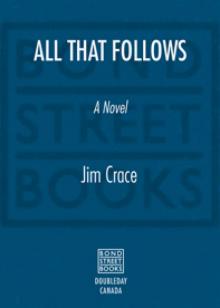 All That Follows
All That Follows Quarantine
Quarantine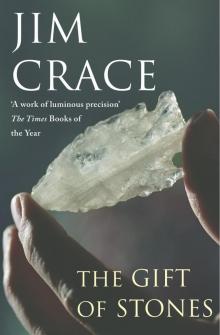 The Gift of Stones
The Gift of Stones The Devil's Larder
The Devil's Larder Genesis
Genesis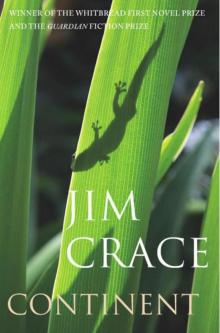 Continent
Continent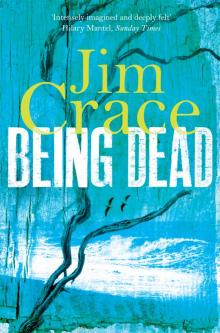 Being Dead
Being Dead Harvest
Harvest Signals of Distress
Signals of Distress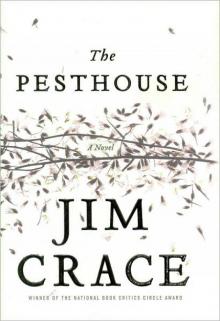 (2007) The Pesthouse
(2007) The Pesthouse